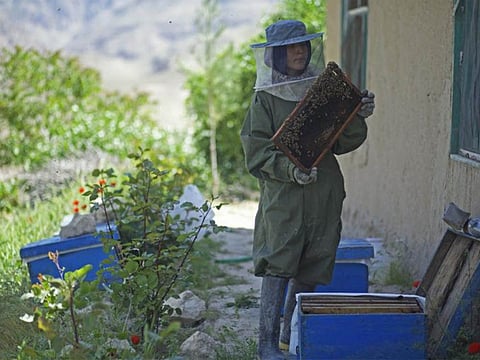Pure grit and honey
How a schoolgirl in Afgahnistan set up a bee keeping business and is now thriving as a role model

London: Three years ago a schoolgirl in rural Afghanistan took out a small loan and bought two beehives. In her first year she harvested 16 kg (35 lb) of honey, enough to repay the loan and leave her with a small profit.
In 2016 Frozan, who is now in her final year at school, earned 120,000 afghanis ($1,728) from the 120 kg that her burgeoning collection of 20 beehives produced - a sizeable sum given that the country’s GDP per person is around $600 a year.
“It is unique for a girl in a rural area like mine to have a private business and make a considerable income, but I trusted myself, took the chance, worked hard and made a success of it,” the 19-year-old said by phone from the city of Mazar-i-Sharif.
Frozan, who goes by one name, is the first schoolgirl in northern Balkh province’s Marmul district to keep bees.
A beekeeping novice three years ago, Frozan was taught by the charity that provided the loan how to look after the bees, how to extract honey, and how to improve its quality and volume.
“It is not time-consuming. I do my daily chores at home, I go to school and I can look after the beehives,” she said.
Citing government figures, Human Rights Watch said last year that 85 percent of the 3.5 million Afghan children not in school are girls. And while two-thirds of adolescent boys are literate, the figure for girls is little more than half that.
That is not the situation for Frozan. The beekeeping profits pay for her and two younger sisters to attend school, and also help her father meet the costs of running a home.
LOOKING AHEAD
Every fortnight, Frozan’s father takes several kilograms of honey to Mazar-i-Sharif to sell to customers at 1,000 afghanis per kg. Among them is the manager of the Kabul Star supermarket.
“I buy her honey because the quality is good, the packaging is nice and the customers like it,” Jawad, who goes by one name, said.
Currently that money helps to pay for Frozan’s schooling, but after she finishes high school next year she plans to move to Mazar-i-Sharif city.
There she will study economics or enter the teacher training program - funded by the beekeeping.
And what of the bees? “My father and my two younger sisters will look after the beehives after I leave. I taught them how to take care of the beehives and keep the business going,” she said.
Frozan says her success has inspired her classmates.
“Most of my friends in school show a lot of interest in starting up their own businesses. They are looking for similar projects to start their businesses and become economically independent like me,” she said.
“I have progressed a lot and my business has expanded vastly. I want all the girls and women to trust themselves and make a move. I am sure they will be successful in whatever they choose to do.”
BOX
Although the position of women has improved significantly since the collapse of the Taliban regime in 2001, said UN Women, traditional practices and insecurity continue to hold them back.
That is one reason why Hand in Hand International - the UK-based charity that loaned Frozan the money to start her business - focuses on women.
“They are a vulnerable group and did not have much in the way of employment opportunities in the past,” said Rafi Azimi, who works for the charity’s regional office in Mazar-i-Sharif.
Frozan is one of more than 38,000 Afghans who have been helped since the charity opened its office in the country in 2007. To reach women, staff run its programmes through mosques and schools - places where women feel secure.
Thomson Reuters Foundation



